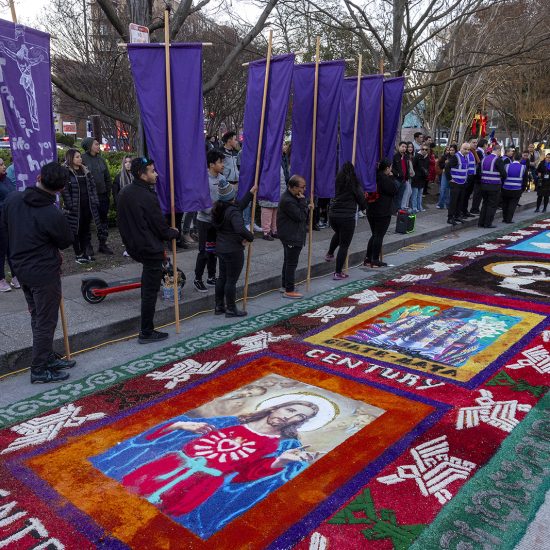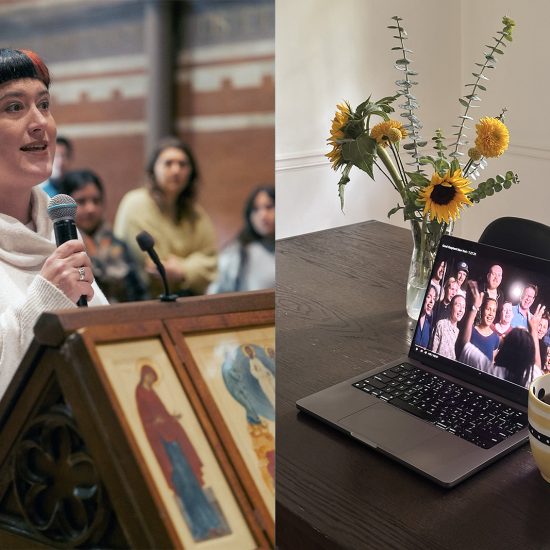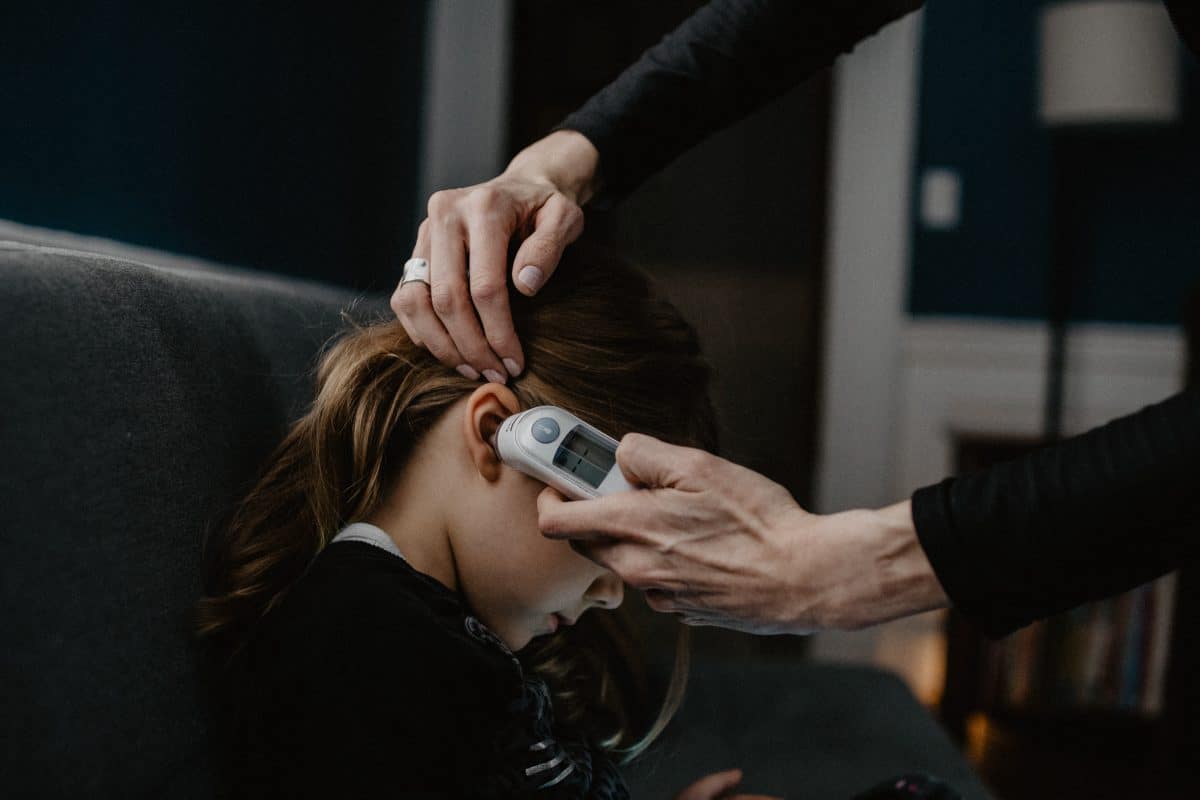
There was a window of time before the Omicron variant swept through our country, when case numbers were down and vaccinations were widely available, when my social media feeds filled with posts from my many preacher friends lovingly cajoling their flocks to come back. “You can’t be a Christian alone or just by tuning in! Gather with us again, back in the building!” they said with heart emojis. Because I love these friends, I would linger over their posts and feel torn, sometimes guilty. My own children were fully vaccinated. My church was open, but we hadn’t gone back.
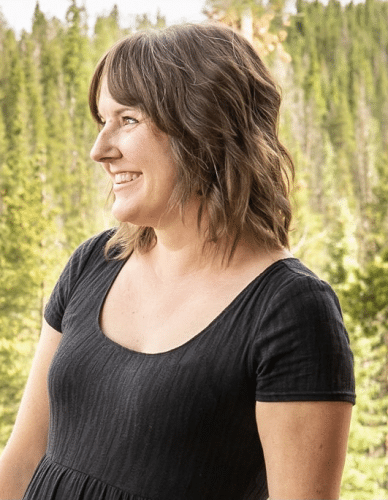
Lauren Graeber
With increasing frequency since this latest Covid wave, there has been another set of posts in my online life. These are the “Parents are Not Okay” articles (Want to catch up? Try here, here, here, here.) These first showed up in my news feeds and then were echoed back at me from parents around the country, sharing and retweeting them, a round-robin of frustration. In January one of my preacher friends shared the Atlantic article She didn’t say anything about how we needed to bring our children back to church. She commented, “Parents of littles: I see you. You are not failing. You are being asked to do the impossible.” I saw her post and burst into tears.
The parents are not okay. To borrow a word from Adam Grant, in his op-ed for the NYT, the parents are languishing. He named it the dominant emotion for 2021, the feeling that “you’re not functioning at full capacity. Languishing dulls your motivation, disrupts your ability to focus, and triples the odds that you’ll cut back on work.” I’d argue that parents of young children are still languishing in 2022 and it’s part of the reason they’re not coming back to church.
I consider my family relatively lucky at this stage of the pandemic, and while our personal risk calculus is far less dire, my friends with little ones who can’t yet be vaccinated continue to worry and juggle disruptions to their child care situations which means disruptions to their work, their ability to make plans, to keep commitments, to take care of themselves every once in a while. They’re languishing. Conversations with them are punctuated by shared sighs, shaking of heads, and they, like us, aren’t going back to church. When life is a series of weighed risks and catching Covid can mean so much more than just the virus itself, then the question becomes: is this gathering worth one of us getting sick, or having to cancel plans, or a week of quarantine?
The few times we have been back to Sunday worship the patterns of behavior were pretty much the same as they had been before the pandemic: Look nice. Act nice. Share snippets of nice conversation before and after the service. When I spend time with other parents, we’re largely incapable of any of those things anymore, much less all of them at the same time. Add on the risks posed by gathering in large numbers where people aren’t always masked and are singing? We’ll pass.
Yet as positivity rates once again drop in my community and we don’t rush back to church, I suspect the deeper motivation for keeping our family home every Sunday is something harder to talk about than health metrics. The experience of a global pandemic that has killed some 6 million people has added a question mark to many of my belief statements, not the ones about God (whom I continue to trust as the source of Love and Life), but absolutely about God’s people. The last two years have broken my faith in humanity as I’ve watched Christians – locally and nationally – fervently argue that their personal “rights” trump the common good.
When we sent our kids back to in-person school with masks on their faces we told them that they wore them not only to protect themselves but out of love for the people around them. You know, like Jesus taught! I have not been able to explain to my children why their good Christian neighbors were unwilling to pick up this particular cross for the sake of others. My fury, confusion, and lament about people’s behavior feels impossible to separate from the churches in which they gather, and so on most Sundays, it’s just been easier to stay home.
We have also had a long time to sit with the feeling of being left behind: congregation-wide celebrations of being back together as a church before it felt safe for our family to do so, committee meetings where everyone but you is cool with eating together when you have an unvaccinated kid at home. There have been announcements that “we’re getting back to normal” but nothing is normal! Not yet, and maybe not quite ever again, and for the families still languishing, asking them to return to normal is not unlike asking someone grieving out to a party or someone sick to go on a run.
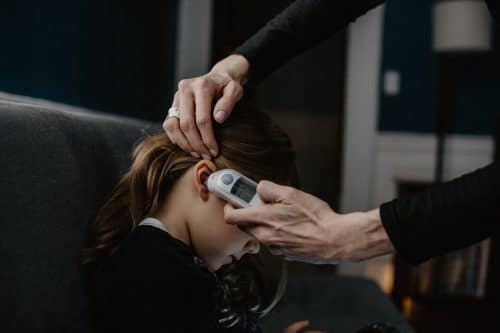
Kelly Sikkema / Unsplash
I know my preacher friends are not wrong. Being Church means being a body of parts that are all different, all valuable, and better together. AND as a life-long churchgoer, even two terrible years hasn’t entirely broken my internal nudge to show up. I miss it. We’ve watched services online and I’ve quietly cried through hymns that have carried me through my life. What might bring us back through the doors?
Being asked to come back. As far as we know, our absence hasn’t been noted, a silence that makes space for us to wonder if anyone misses us. I don’t think our congregation or our ministers are callous. I think they’re too polite. I’d recommend texting. The parents are not okay and they do not like to answer calls.
Being asked about the parts of life that have been broken in the last two years. Trust me that we’re very clear about the answers. We have memes and reels to illustrate what we mean and you should watch those, so we can laugh darkly together. We need Church to be a place that can hear about the financial, social, and emotional losses we’ve experienced. We need a Church that will hear how fear has become part of our lives like never before, even though we are the generation that came of age with 9/11 and the financial collapse of ’08 and the killing of children like ours at Sandy Hook. We need a Church that will listen without judgment to our complicated feelings about worship, creeds, prayer, and the other folks in the pews.
Being asked what we need now. In fact, it’s not exactly true that my family hasn’t been back at church. The one thing we never miss is our children’s weekly Godly Play meeting. Our family minister has gone to great lengths to make that as safe as she could: meeting outside, requiring masks, having all the adults vaccinated. We drop our children off without fail because that hour and a half is a standing date for my husband and me. Even when the question of bringing a babysitter into our home has felt iffy, we have been able on Wednesday afternoons to feel a little lighter, like adults, like people who care for their marriage. I don’t know what other parents need (You should ask them!), but we need Godly Play, and I’m immensely grateful that my church gives us that time.
In the absence of my regular Christian community over the last two years, I have filled my social media feeds with a collection of Christian writers who are honest about how we’re doing. They write liturgies for the exhausted, the disappointed, the broken-hearted. They see that we’re languishing and they invite God to be present with us. I whisper their words every week, praying over the tiny screen of my phone. I send them to friends who I know need them. They send them to me.
Those few times we have brushed our kids’ hair and dug out the nice pants and hauled ourselves to church, the ancient liturgies had not been amended to accommodate these times. They were still formal words of belief in a fixed story, and I was too tired and messy inside to find myself in them, so instead I went home and returned to those Instagram posts that made intentional space for this weird, weird world. I also made warm bread in my kitchen and handed it to my children with a blessing, and we ate that on a Sunday morning rather than cold communion wafers. We are not okay, but we are finding our way, and it might be – if you asked – that we could find our way back to church.
Lauren Graeber is a writer, teacher of writing workshops, and Co-Director of the Center for Prayer and Spirituality at St. Mary’s Episcopal Church in High Point, North Carolina. She navigates faith, parenting, and questions that delightfully refuse to be answered on IG @definitelysometimes.



